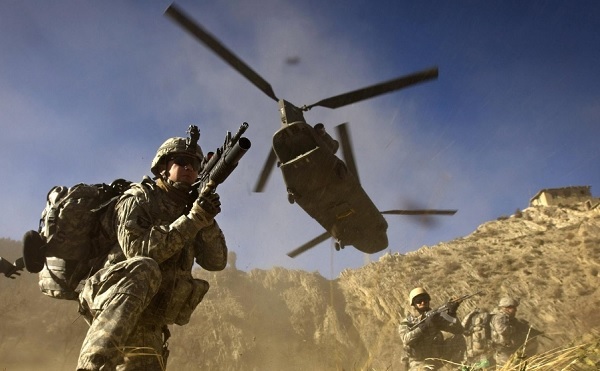
How the US and her NATO allies lost trillions in a vain effort to turn Afghanistan into Denmark
THE LAST WORD | ANDREW M. MWENDA | After twenty years of occupation and trillions of dollars spent fighting the Taliban, the United States and her NATO allies are beating a hasty retreat from Afghanistan. As they withdraw, the Taliban are rolling across the country against little resistance from the Afghan national army. According to media reports, soldiers from the national army are abandoning their military posts without a fight. The situation in Afghanistan is the best evidence of the follies of foreign aid in all its forms – financial, technical, humanitarian, military, state-building, and democratisation.
The U.S. and her NATO allies invaded Afghanistan to overthrow the Taliban in 2001. Their aim was to build a viable state and economy, end “Islamic terrorism” and establish a liberal democracy. To achieve these lofty aims, the USA has spent $2.26 trillion on Afghanistan over the last twenty years. That is larger than the entire GDP of the whole of Africa. Of this, $816 billion have been spent on the military alone – to fight the Taliban and also train and equip the Afghanistan national army. This figure does not include the money spent by the USA NATO allies.
The comedian Kathleen Madigan best captured this contradiction when she visited an American forward operating base in Helmand province in Afghanistan in 2010. She told a story of meeting a young marine captain who pointed to a nearby Afghan village and described how his unit was busy building a school, establishing a health clinic, creating a local government center, training and reforming the police, helping the people with grievance resolution, actively supporting gender rights via a U.S. marine “female engagement team”, improving agricultural productivity etc. As the list continued to grow, Madigan interrupted the marine officer and asked: “Captain, when are you going to invade Detroit?”

The retreat of the U.S. and her NATO allies, and the collapse of the Afghan army they have trained and equipped for 20 years in the face of a poorly trained, poorly equipped Taliban only shows that scale of wastage that has gone into this enterprise. It also exposes the delusions in the Western mindset. As Madigan’s observation above shows, the U.S. and her NATO allies have been involved in practically every aspect of Afghanistan life. It is hard to find the total amount of money spent on the state building and democracy promotion project by other NATO members. But whatever the amount, it is the largest experiment in imperial hubris.
The lesson from this failed experiment is that state and nation building is a complicated business. It cannot be imposed from outside regardless of the amount of money, goodwill and noble intentions invested. To work, it has to be largely an endogenous enterprise. Local elites must have incentives to build a viable state and economy. Short of such local interest, little can be achieved. The West needs to learn a little bit of humility. They failed in Afghanistan because they went into that country with a set of assumptions about the kind of life and government Afghan people desired. They ignored culture, history and aspirations of its people.
Let me illustrate. In 2009, newly elected U.S. president, Barack Obama, ordered a surge in Afghanistan. The aim was to “secure” the indigenous population in areas deemed centers of gravity economically, politically and militarily. Surge advocates argued that this would create stable areas where “good government” (according to who?) would emerge, the rule of law (which and whose law?) would take root and prosperity (defined as what, by who and for whom?) would grow. Essentially, NATO sought to create Denmark in Afghanistan. But is that what the local people wanted?
Here is how complex nation and state building is. As Karl Eikenberry, formerly a U.S. commander in Afghanistan, later ambassador in Kabul wrote, when NATO claimed it sought to protect the local population, this protection was from what and against whom? “Was it to protect people against the Taliban? What of criminal narcotraffickers, venal local police or corrupt government officials?” Eikenberry asked. I would also add; was it also to protect wives and children from abusive husbands and fathers, or the religious faithful from authoritarian and rigid clerics, the poor against the exploitative rich? Every society has many fault lines.
America and her NATO allies went with a blue print for Afghanistan which they believe would be the basis of creating governmental and state legitimacy. But it is a tool kit picked from Belgium and Denmark that may have little relevance to Afghan people i.e. a liberal democratic government. They thought legitimacy is based on the election of the president and legislators through free and fair democratic elections contested by a multiplicity of political parties. Such government must deliver public goods and services to all citizens, ensure security of person and property, enforce the rule of law and promote economic prosperity.
With the exception of security, these other bases of legitimacy are a Western concept that may not resonate with Afghan people. Military victory against the Taliban proved elusive, so NATO could not ensure security. The Afghanistan government just did not have the resources to pay for a large basket of public goods and services for all of its citizens to serve as the basis of legitimacy, even if that could work. Consequently, 90% of her budget was being paid for by NATO. But this money came with many dos and don’ts based on Western conceptions of ethical governance that have little resonance with Afghan culture.
For instance, governmental legitimacy may require that an Afghan president literally buys off powerful elites from the different ethnic and religious factions of that society using corruption and patronage. That may be (and I actually think is) the only legitimate political currency that the people of Afghanistan understand. In legally prohibiting many forms of corruption, the new order was criminalising the legitimate instruments of creating a minimum political consensus among Afghan elites.
To be fair, at some point the Americans recognised this fact and would deliver bags of cash to the office of President Hamid Karzai for buying off elites. However, this was done at night. Openly, many sections of the liberal elite continued with sanctimonious summons denouncing the corruption of the government and thereby delegitimising it. Afghans had little legroom for independent action to govern the country as they knew how to.
Now the U.S. needs to settle for a Taliban government. Through its brutality, the Taliban might secure the state, ensure stability and evolve the government that Afghans understand and appreciate. The foreign project was dead on arrival.
****
amwenda@independent.co.ug
 The Independent Uganda: You get the Truth we Pay the Price
The Independent Uganda: You get the Truth we Pay the Price



1.Being associated with the first World has lots of benefits thats why sober Arab nations like Saudi Arabia,UAE,Qatar,Burahan,Egypt and Algeria are doing well simply because of their flexibility when it comes to dealing with the first world, balancing Religion and Business while states like Iraq,Afghanistan,Pakistan have a long way to go simply because they feel that the first world has a hidden agenda towards them.
2. Its not by accident that African Nations like Gambia,Mali,Dafur and South Sudan and Niger still have a long way to go simply coz of Religion.
3.How can the parts of the Arab world embrace the First World with open hands?
4.Its just natural that at a certain stage; Human beings want to be free;Just look at Cuba they are fed up of Communism i guess if a referendum is held in the parts of the Arab world on whether NATO should be withdrawn the results would be in NATO’s favor.
5.In Parts of Southern and Eastern Africa, Nation building by the British was resisted by the natives they thought that Colonialism was a bad idea but it has been the best thing to have ever happened to nations under the Common wealth;They speak English which is a common and sophisticated language( Ask the Chinese),they have similar laws,Business ,Trade interest,and Education.I guess if parts of the Arab Wold allowed to be colonized they would enjoy them selves like the People of Qatar and Saudi Arabia.
“dead on arrival” just like major Gregory Mugisha Muntu and ant….
I have recently been thinking … why not legitimize “corruption” in Uganda? Socio-culturally we have an ingrained sense of quid pro quo … that’s perfectly normal … but can be mistaken for corrupt acts.
For example … when a citizen takes a chicken for a staff doctor at a local health centre … in gratitude and in the African/Ubuntu/Ugandan spirit of generosity … is that corruption?
If you transpose a similar sociocultural transaction in Kampala … it won’t be chickens exchanging hands but cash. Is that corruption?
True … there are exploitative service providers / authority figures that are indeed corrupt.
But many of the transactions that pass as “corruption” from a European/ Western lens … are indeed gestures of sociocultural generosity / gratitude.
I do agree with you … systems and solutions must be locally sourced; not copy and pasted in whole from foreign blueprints.
PS: I have had opportunity to interact with Black Communities from the Carribean / West indies / Americas … and I am always amazed that over 400 years later … there are still cultural remnants of African social interaction … [completely distinct from the predominant European worldview they have become part of].
In other words … globalisation doesn’t mean all territories must operate in exactly the same way politically or otherwise.
Rajab, we do not have “Major” Gregory Mugisha Muntu on the known list of Army Officers in Uganda!